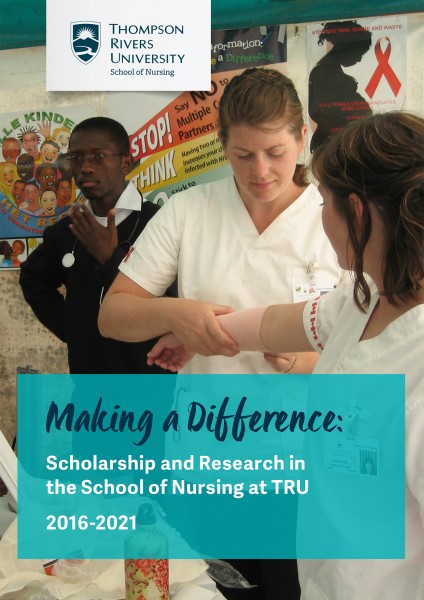Poster presentations by nursing faculty members showcased the impact of their research on public health as the School of Nursing launched its new strategic research plan on Mar. 7.
“Making a Difference: Scholarship and Research in the School of Nursing at TRU, 2016-2021” identifies strategic directions for the school and prioritizes four themes for scholarship and research over the next five years.
“Nursing research is very diverse because of the very nature of the sphere of influence of nursing at levels of patient, family, community and populations,” said Dean of Nursing Dr. Donna Murnaghan at the launch event.
“The critical element of nursing research and scholarship is to enhance the knowledge, skills and expertise of nursing students to provide optimal outcomes for patients and clients. Scholarship by TRU nursing faculty informs new ways to deliver health care, and evaluates the impact of new techniques for delivering nursing care.”
Murnaghan said the research being conducted at TRU has the potential to influence health policy, improve delivery of care, and help attract and prepare the next generation of nurses to fill much-needed nursing positions in rural areas, particularly in Aboriginal communities across the province. The theme of Indigenous Health and Pedagogy builds on current and past research and scholarship spanning Indigenous health human resources, cultural competence and cultural safety in nursing education, while Leadership and Policy research responds to the strong need for future leadership as many experienced nurses in the province approach retirement. Research and scholarship on Community Health Nursing and Population Health brings together rural health, women’s health, seniors’ health and palliative care, and many other areas where new knowledge gained will directly benefit the public.
 “Nursing is innovative in education,” said faculty member Tatiana Little.
“Nursing is innovative in education,” said faculty member Tatiana Little.
In the theme of Excellence in Teaching and Learning, Little’s research addresses an issue in nursing education that aligns with TRU’s strategic priorities as a whole: access. Her poster presentation included a laptop on which she and her doctoral thesis supervisor, Dr. Valerie Irvine, director of the Technology Integration and Evaluation (TIE) lab at the University of Victoria, demonstrated “cyber proxies”, using robots to enable online access to physical classrooms and labs.
With the shortage of nurses projected to increase, greater accessibility to education is another way nursing research and scholarship serves communities as well as the next generation of nurses.
“Through a detailed and reflective process faculty members worked collegially to identify core themes areas that reflect the strength of the department in areas of scholarship and research,” said Murnaghan. She recognized the collaboration with visiting scholar Dr. Margaret Fitch and leadership by faculty members Star Mahara, Michelle Seibel and Dr. Susan Duncan.
“We are excited about the current and potential growth that will be articulated as faculty members work as teams in developing, supporting and enhancing research capacity into the future.”

